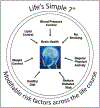A Primary Care Agenda for Brain Health: A Scientific Statement From the American Heart Association
- PMID: 33719523
- PMCID: PMC8995075
- DOI: 10.1161/STR.0000000000000367
A Primary Care Agenda for Brain Health: A Scientific Statement From the American Heart Association
Abstract
A healthy brain is critical for living a longer and fuller life. The projected aging of the population, however, raises new challenges in maintaining quality of life. As we age, there is increasing compromise of neuronal activity that affects functions such as cognition, also making the brain vulnerable to disease. Once pathology-induced decline begins, few therapeutic options are available. Prevention is therefore paramount, and primary care can play a critical role. The purpose of this American Heart Association scientific statement is to provide an up-to-date summary for primary care providers in the assessment and modification of risk factors at the individual level that maintain brain health and prevent cognitive impairment. Building on the 2017 American Heart Association/American Stroke Association presidential advisory on defining brain health that included "Life's Simple 7," we describe here modifiable risk factors for cognitive decline, including depression, hypertension, physical inactivity, diabetes, obesity, hyperlipidemia, poor diet, smoking, social isolation, excessive alcohol use, sleep disorders, and hearing loss. These risk factors include behaviors, conditions, and lifestyles that can emerge before adulthood and can be routinely identified and managed by primary care clinicians.
Keywords: AHA Scientific Statements; aging; brain; cognitive dysfunction; primary health care; primary prevention; risk factors.
Conflict of interest statement
The American Heart Association makes every effort to avoid any actual or potential conflicts of interest that may arise as a result of an outside relationship or a personal, professional, or business interest of a member of the writing panel. Specifically, all members of the writing group are required to complete and submit a Disclosure Questionnaire showing all such relationships that might be perceived as real or potential conflicts of interest.
Figures
References
-
- US Census Bureau. 2017 National population projections tables: main series (updated October 8, 2019). 2017. Accessed February 21, 2021. https://www.census.gov/data/tables/2017/demo/popproj/2017-summary-tables...
-
- Crimmins EM, Kim JK, Langa KM, Weir DR. Assessment of cognition using surveys and neuropsychological assessment: the Health and Retirement Study and the Aging, Demographics, and Memory Study. J Gerontol B Psychol Sci Soc Sci. 2011;66(suppl 1):i162–i171. doi: 10.1093/geronb/gbr048 - DOI - PMC - PubMed
-
- Department of Health and Human Services, Center for Medicare & Medicaid Services. Rules and regulations. Federal Register (Part II); 752010. 42 CFR Parts 405, 409, 410, et al. Medicare Program; Payment Policies Under the Physician Fee Schedule and Other Revisions to Part B for CY 2011; Final Rule, Accessed February 21, 2021. 73170 Federal Register / Vol. 75, No. 228 / Monday, November 29, 2010. / Rules and Regulations. - PubMed
Publication types
MeSH terms
Grants and funding
LinkOut - more resources
Full Text Sources
Other Literature Sources
Research Materials


